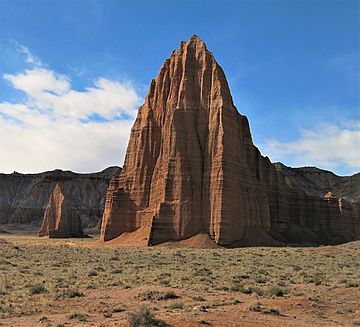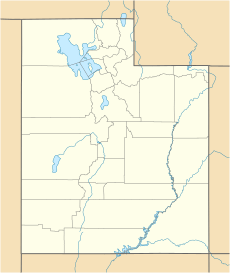Temple of the Sun (Utah) facts for kids
Quick facts for kids Temple of the Sun |
|
|---|---|

Temple of the Sun, north aspect
|
|
| Highest point | |
| Elevation | 5,822 ft (1,775 m) |
| Prominence | 402 ft (123 m) |
| Isolation | 1.50 mi (2.41 km) |
| Parent peak | Point 6529 |
| Geography | |
| Location | Capitol Reef National Park Wayne County, Utah, US |
| Parent range | Colorado Plateau |
| Topo map | USGS Fruita NW |
| Geology | |
| Age of rock | Jurassic |
| Type of rock | Entrada Sandstone |
| Climbing | |
| Easiest route | closed to climbing |
The Temple of the Sun is a tall rock formation, about 5,822 feet (1,775 meters) high. You can find it in Capitol Reef National Park in Wayne County, Utah, United States. This amazing, stand-alone rock is far away from cities. It's about 12.5 miles (20.1 km) north of the park's main visitor center. It's also very close, just 0.37 miles (0.60 km) north, to another cool rock called Temple of the Moon. Both are in a part of the park called Cathedral Valley.
In 1945, Charles Kelly named this area "Cathedral Valley." He was the first superintendent of Capitol Reef National Monument. The tall sandstone rocks in the valley reminded early explorers of grand, old churches with fancy walls and towers. The Temple of the Sun stands over 400 feet (122 meters) taller than the land around it. This area is part of the Fremont River water system. A famous explorer, John C. Frémont, passed through Cathedral Valley in 1853.
How Temple of the Sun Was Formed
The Temple of the Sun is made of a type of rock called Entrada Sandstone. This sandstone is a buff-pink color and is very solid. Scientists believe this rock formed about 160 million years ago during the Jurassic period. Back then, the area was a huge sandy mud flat. It was part of the largest sand sea ever known on Earth.
The layers of rock in Cathedral Valley are mostly flat, tilting only a little bit (three to five degrees) to the east. Later, the entire Colorado Plateau slowly lifted up. This lifting kept the rock layers mostly flat. However, Capitol Reef National Park is special because of something called the Waterpocket Fold. This is a huge bend in the rock layers, like a giant wrinkle. It formed between 50 and 70 million years ago.
Gallery of Images
Weather and Climate
The best times to visit Temple of the Sun are in spring and fall. The area has a Cold semi-arid climate. This means the coldest month has an average temperature below 32°F (0°C). Also, at least half of the yearly rain falls during spring and summer. This desert area gets less than 10 inches (250 mm) of rain each year. Snowfall in winter is usually light.
| Climate data for Capitol Reef Visitor Center, elevation 5,653 ft (1,723 m), 1981-2010 normals, extremes 1981-2019 | |||||||||||||
|---|---|---|---|---|---|---|---|---|---|---|---|---|---|
| Month | Jan | Feb | Mar | Apr | May | Jun | Jul | Aug | Sep | Oct | Nov | Dec | Year |
| Record high °F (°C) | 58.6 (14.8) |
68.3 (20.2) |
78.3 (25.7) |
84.4 (29.1) |
94.6 (34.8) |
100.2 (37.9) |
100.8 (38.2) |
97.9 (36.6) |
95.4 (35.2) |
86.1 (30.1) |
70.4 (21.3) |
61.5 (16.4) |
100.8 (38.2) |
| Mean daily maximum °F (°C) | 40.6 (4.8) |
46.4 (8.0) |
54.7 (12.6) |
65.0 (18.3) |
74.5 (23.6) |
85.3 (29.6) |
90.4 (32.4) |
87.9 (31.1) |
80.2 (26.8) |
66.1 (18.9) |
51.3 (10.7) |
40.6 (4.8) |
65.3 (18.5) |
| Mean daily minimum °F (°C) | 17.8 (−7.9) |
22.7 (−5.2) |
30.2 (−1.0) |
36.2 (2.3) |
44.7 (7.1) |
53.1 (11.7) |
60.4 (15.8) |
58.5 (14.7) |
50.4 (10.2) |
39.0 (3.9) |
27.6 (−2.4) |
18.2 (−7.7) |
38.3 (3.5) |
| Record low °F (°C) | −4.2 (−20.1) |
−11.8 (−24.3) |
9.1 (−12.7) |
18.1 (−7.7) |
27.2 (−2.7) |
34.6 (1.4) |
42.4 (5.8) |
45.1 (7.3) |
29.9 (−1.2) |
11.7 (−11.3) |
8.0 (−13.3) |
−7.5 (−21.9) |
−11.8 (−24.3) |
| Average precipitation inches (mm) | 0.52 (13) |
0.34 (8.6) |
0.53 (13) |
0.47 (12) |
0.59 (15) |
0.47 (12) |
0.91 (23) |
1.20 (30) |
0.80 (20) |
0.98 (25) |
0.49 (12) |
0.32 (8.1) |
7.62 (194) |
| Average dew point °F (°C) | 17.3 (−8.2) |
20.8 (−6.2) |
23.0 (−5.0) |
24.5 (−4.2) |
29.1 (−1.6) |
32.0 (0.0) |
40.0 (4.4) |
41.8 (5.4) |
34.8 (1.6) |
28.2 (−2.1) |
21.9 (−5.6) |
17.5 (−8.1) |
27.6 (−2.4) |
| Source: PRISM | |||||||||||||
 | Madam C. J. Walker |
 | Janet Emerson Bashen |
 | Annie Turnbo Malone |
 | Maggie L. Walker |









